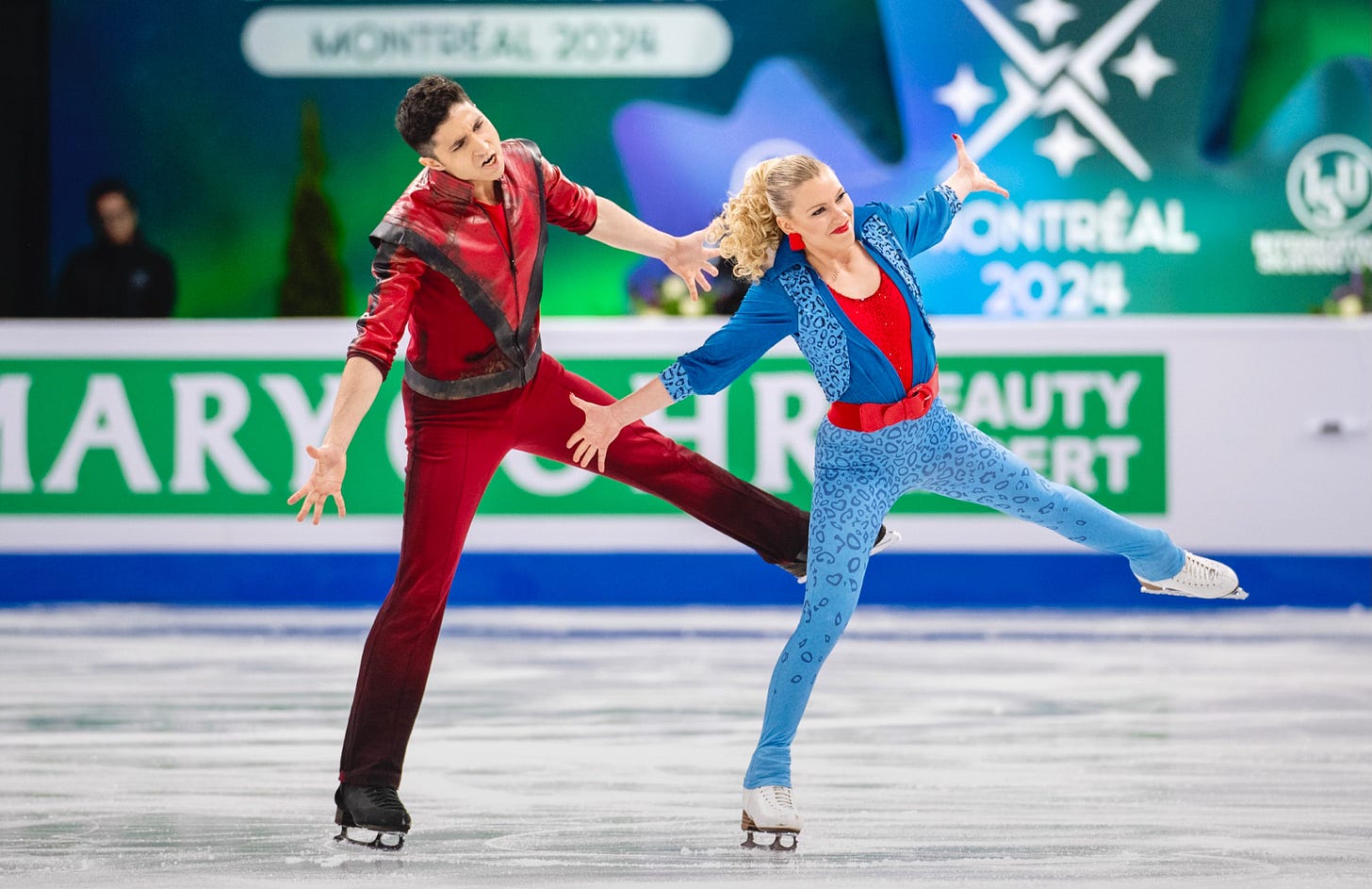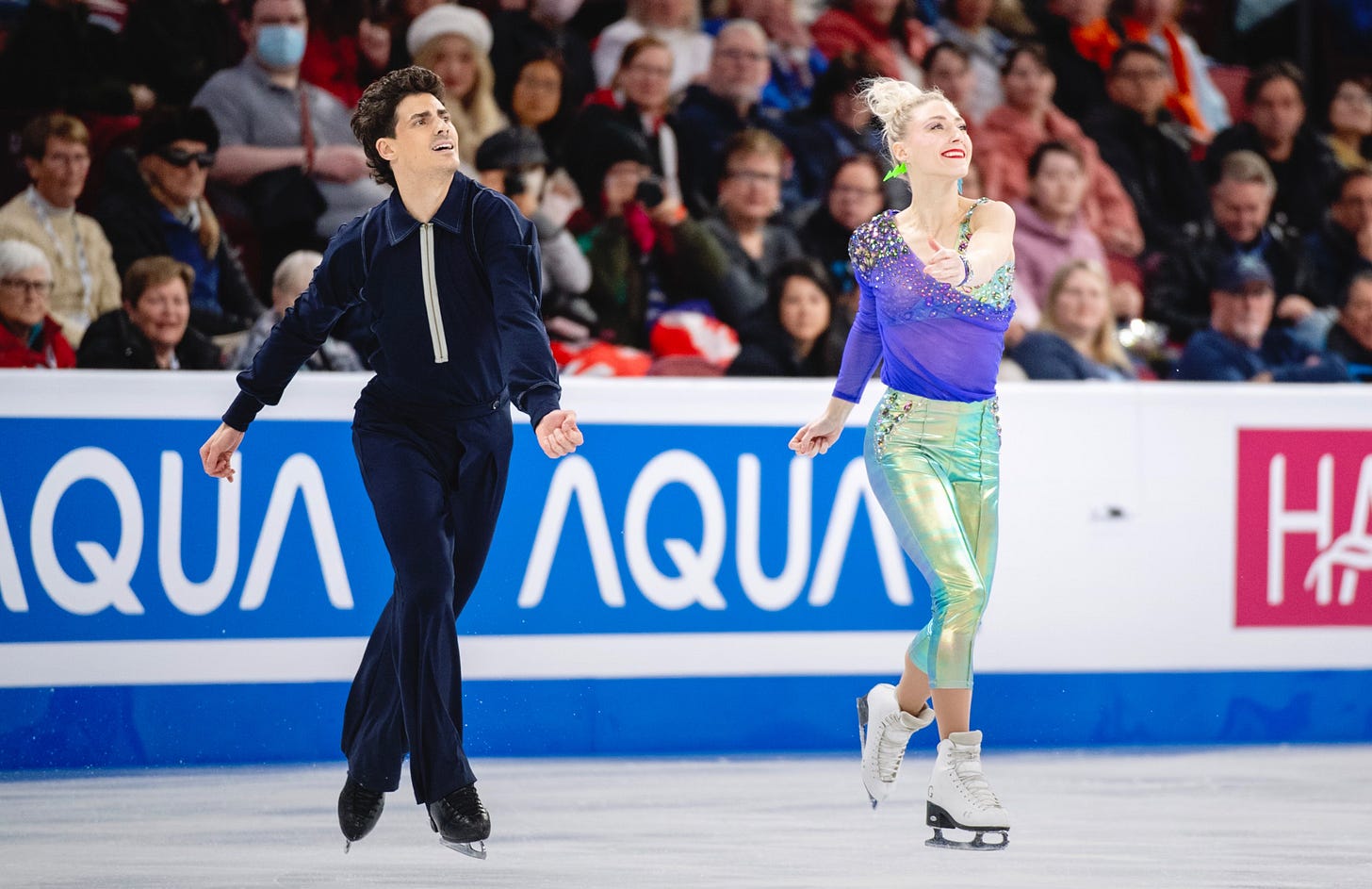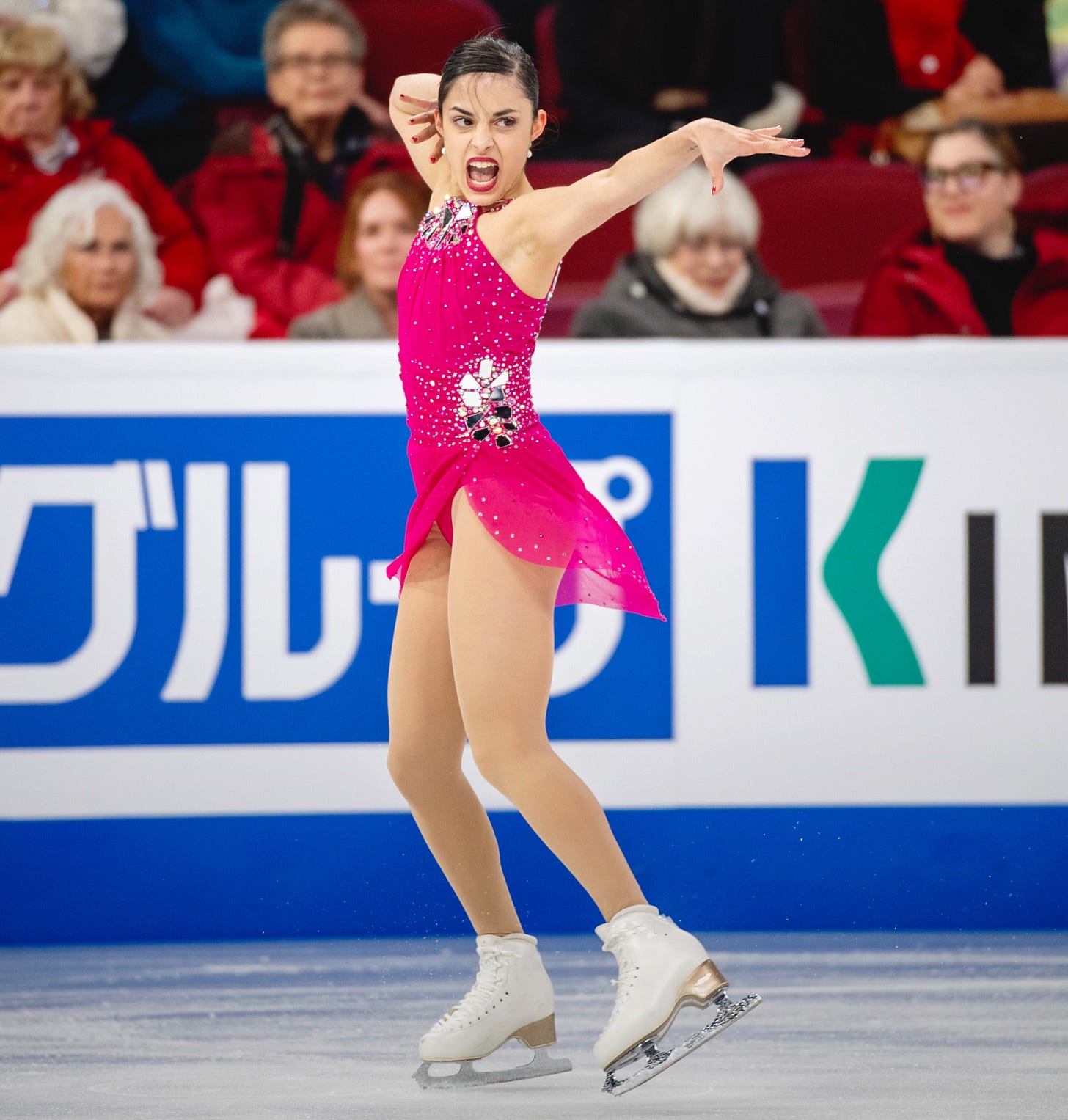Worlds 2024: A Thriller in the rhythm dance
With the effect of a 'bad' concussion behind her, Canada's Majorie Lajoie and Zachary Lagha make a quantum leap into the top five against the world's best.

MONTREAL — Four years later, it couldn’t happen again, right? Or could it?
That was the feeling of dread that engulfed Marjorie Lajoie in the weeks leading up to the World Figure Skating Championships at the Bell Centre. Which, for Lajoie and ice dance partner Zachary Lagha — who are both from the Montreal area and train at the powerhouse Ice Academy of Montreal — represented the ultimate home Worlds. And a chance to atone for the fact that, four years ago, they had the same opportunity in front of them and had it wiped out by the COVID-19 pandemic.
But as the effects of a “bad” concussion frustratingly lingered with the calendar moving ever closer to this week, the 23-year-old Lajoie couldn’t help having this horrible thought. Not again.
“We were supposed to go (in 2020) and it was cancelled. So I was no, I’m not going to (miss) it (again),” she said following Friday’s rhythm dance at the Bell Centre. “But if it was for my health, and we said it was too dangerous, I wouldn’t go for sure because it’s the brain. But I had the go (ahead) and I was just so grateful.”
Thankfully, that green light came about a week or so ahead of the competition here. And that no doubt had Lajoie and Lagha smiling even wider during their energetic “Thriller” program that had the audience roaring by the time it was done. Those smiles grow ever wider when they saw a personal best mark of 82.30 flash up on the scoreboard, which has the Canadians standing fifth heading into Saturday’s free dance final. It has the couple poised for a breakthrough finish at Worlds (they were 11th in 2022 in Montepellier, France). They placed sixth at the Grand Prix Final back in December in their first appearance at the event. But darker days would arrive in the weeks that followed.
Lajoie’s concussion was suffered in training when she “fell on my butt and had a whiplash, so my brain moved in my head.” But while it wasn’t a direct blow to the head, she said “the impact was in the right place (to cause a concussion), I guess. What is dangerous is because I didn’t fall on my head, I didn’t know I had a concussion. I didn’t feel it right away. But it’s weird because I thought it was just a fall. It was two days later that I started to feel the symptoms and it was really bad. It was a big, big concussion; it was the first injury I’ve had in my life.”
The injury kept Lajoie off the ice for a month, and caused she and Lagha to pull out of both the Canadian and Four Continents championships. But as often happens with concussions, the symptoms continued to linger. There were good days and bad, and a whole lot of uncertainty.
“During that month, I was still having some symptoms. It was safe … we were following the (concussion protocol) steps. But it was a long injury and a bad one,” said Lajoie. “With my concussion, I had some ups. I could train and be good and then have some very big downs. I was like ‘oh, I’m not going to make it (to Worlds). It’s impossible, it’s so hard.’ I would say about a week and a half before (Worlds) or even just a week, I would stop having those downs and I had the go (ahead) to go compete. And I thought what timing, what perfect timing.”
Lagha, meanwhile, had to figure out ways to keep himself engaged and ready for the day Lajoie would finally be ready to get back on the ice.
“It’s all about staying professional. If Marjorie is injured, what can I do to help the team? And so I had some things to work on so I could improve myself, so when Marjorie comes (back), the damage is less,” said the 24-year-old Lagha. “I worked hard with my coaches and they helped me a lot to improve.”
Needless to say, their rhythm dance never felt better than it did Friday.
“Even more happy than we would have been if we skated that well (without the injury), just because of knowing the history of missing two competitions, missing a full month of training, back only two or three weeks before (Worlds),” she said. “To skate like this, it was the best-case scenario. I was really happy.”
In the bigger picture, Canada appears in very good shape to keep three ice dance berths for 2025 Worlds in Boston, which will determine the team sizes for the 2026 Winter Olympics in Milan-Cortina. As expected, Canadian champions Piper Gilles and Paul Poirier are right in the medal hunt, standing third in the rhythm dance behind reigning World champions Madison Chock and Evan Bates of the United States. Italy’s Charlene Guignard and Marco Fabbri are second, just 1.01 points ahead of the Canadians.
“I think we had a great time today. We really skated our best that we could do today and I really enjoyed it in front of a Canadian crowd … I felt the energy from them the whole time,” Gilles said of their skate to “No More I Love You’s,” by The Lover Speaks, and Robert Palmer’s “Addicted to Love.”
Along with the rest of the Canadian team, Gilles and Poirier felt inspired by the gold medal triumph of Deanna Stellato-Dudek and Maxime Deschamps in the pairs event on Thursday night. But the 32-year-old Gilles, for one, isn’t exactly ready to commit to skating as a 40-year-old.
“I’m never going to be that person to say no or I’m not doing that. Our life has gone in so many different directions that I really didn’t expect,” she said. “Not anticipating it, but it’s absolutely inspiring. She inspires so many women that I know. It’s just really special to see her achieve her dreams at her age.”

But here’s another thought along those lines: if the top three hold their positions, it will be the second straight year that the ice dance podium at Worlds is filled with skaters above 30 years old. It had never happened previously (Chock is 31, Poirier is 32, Guignard 34, Bates 35 and Fabbri 36).
The third Canadian entry, Laurence Fournier Beaudry and Nikolaj Soerensen, slipped to 10th after the rhythm dance (she had a major error on the twiddles). But much of their visit to the media mixed zone (at least the English part of it) centred around the sexual assault allegations Soerensen in facing, which are currently the subject of investigation by Canada’s Office of the Sport Integrity Commissioner. It led the duo to withdraw from the Canadian Championships, citing their desire to “not be a distraction.”
“It was really fresh for everybody and especially myself, emotionally it was really tough for us. Something like that can be really traumatic for you when you don’t at all feel like you did anything wrong,” said Soerensen, who has staunchly denied the allegations. “A story like that breaking for anybody can be really tough. In the moment, we just didn’t feel like we could do it.”
Asked why the “distraction” issue didn’t exist at Worlds, he said “I would say the story is further behind us.” When pressed further on the issue by reporters, he was whisked away.
“The (investigation) process is doing its course and we’re just following every step, every rule,” said Fournier Beaudry. “And we trained really hard to be here and we’re very happy to have the chance to compete here.”

‘Disappointing’ finish for Maddie
This was the Worlds when it was supposed to change. When Canada’s Maddie Schizas made her move into a place among the top 10 on the sport’s biggest stage. Instead, the 21-year-old was left to wonder what went wrong after tumbling to an 18th place finish at the Bell Centre — five spots lower than a year ago in Saitama, Japan, and her lowest ever.
Friday night’s free skate was a microcosm of her week in Montreal. She started out with a crisply executed triple Lutz-triple toe combo and triple flip, then doubled a planned triple Salchow. It all unravelled from there and left Schizas frustrated with an unsatisfying finish.
“I’m very disappointed with my program. I think that’s all there is to say. It was not good, it was not what I practised and it wasn’t what I wanted to show today,” she said. “So I think I’m going to have to go home and reflect on it a little bit and figure out what happened. It was exciting skating before a Canadian audience and perhaps a little overwhelming. I was overwhelmed with the support, even though it didn’t go the way I wanted it today and for that, I’m very grateful.
“My three hardest elements I got right off the top. The things I missed (in the short program), I had no problem, and the things that are so easy for me in practice, I just fumbled. Right down to the step sequence: Level 1.”
Schizas went to great pains and effort to change her approach this season, saying back in the summer that she had wearied of the 12th and 13th-place finishes in her first three trips to Worlds. She enlisted two sets of new choreographers, all of them ice dance coaches, in an effort to re-invent herself. While it can surely be said she matured on the performance side of her skating, it was the technical part that wasn’t consistent enough.
“It’s especially disappointing. It’s been a big effort to do everything,” she said of the changes, which had her driving to London and Toronto for choreography. “I had to rely on my family and rely on so many different supports to work on the skating skills side. It’s far away from where I live to really do that, but I did put in that effort. It’s definitely frustrating for the way this worked out.”
When questioned about whether she might enlist a mental performance coach, Schizas didn’t discount the idea, saying “maybe that’s something I need to consider a little bit more seriously because clearly I had it in me and didn’t put it together. For the longest time, one of my strengths was the mental side of my skating. I was so good at putting it out when it counted. I think part of that is it was all new. It was really new that first year. The Olympic year is so new and so exciting all the time. I just went out there, got excited and got it done. I need to find that again, that excitement to get it done.
“It’s going to be probably the biggest struggle in the next couple of years, putting that together. I want to compete at another Olympic Games, I want to contribute to getting (more) spots. Obviously, that’s not happening now. We aren’t getting a second spot back (at Worlds), which sucks (she needed a top 10 finish to accomplish that). So I’m just going to work hard and try to figure this out for next season. I want to be among the best in the world.”
Despite what happened in Montreal, Schizas is steadfast in maintaining that top 10 at Worlds isn’t out of reach for her.
“I really hope so. I really hope I have it in me. I skate programs and put up scores that could contend with the top in the world,” she said. “I’m seemingly still struggling to put it together when it counts, so I’m going to have to figure that out. My scores this year, the top ones, compete with the top in the world.”
While the 18th place finish stings, Schizas still can take home some positives.
“There’s always positive things. I’m so grateful I got to skate in front of a Canadian audience. It was once in a lifetime,” she said. “I’m grateful to be a part of the Canadian team, grateful for so much in this week’s experience. I had all my family here on Wednesday, which was so incredible to me … there were so many things to take away from this to be grateful for. It’s just the end result wasn’t what I wanted.”
Meanwhile, it was another banner night for Japan’s eminently popular Kaori Sakamoto, who rose from fourth after the short program to the top of the podium for the third straight time at Worlds. The 23-year-old made the most of skating fourth from the end (an ideal draw, in this observer’s eyes), turning in a glorious free skate that produced a huge 149.67 score. Then she sat back and watched the final three contenders try to surpass what she had done. None of them could, and it was Sakamoto’s title again. Being that we’re in Montreal, we’ll call it the Kaori hat trick.
American teen Isabeau Levito of the United States had the other skate of the night, floating through her elegant free program. It landed her in the silver medal spot of the podium, with South Korea’s Chaeyeon Kim rising from sixth to bronze. Short program winner Loena Hendrickx tumbled to fourth.
The World Championships conclude Saturday with the free dance (1:30 p.m.) and men’s free skate (6 p.m.). Here are the start times for Canadian skaters.
Ice Dance: Laurence Fournier Beaudry/Nikolaj Soerensen, 3:23 p.m.; Marjorie Lajoie/Zachary Lagha, 4:09 p.m.; Piper Gilles/Paul Poirier, 4:42 p.m.
Men: Wesley Chiu, 7:24 p.m.; Roman Sadovsky, 8:18 p.m.





